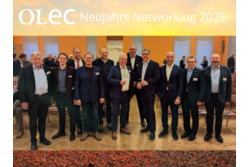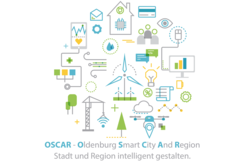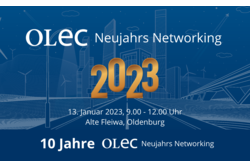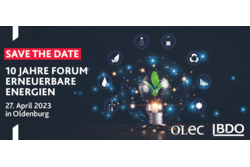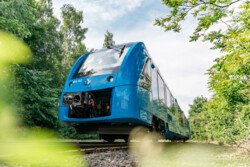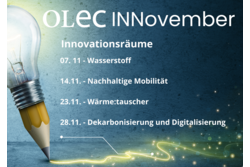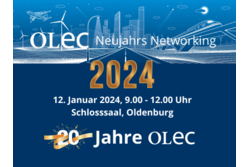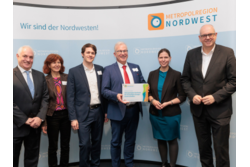
The Northwest Metropolitan Region is the showcase of the energy transition. In order to maintain its pioneering position, further regional efforts and important decisions are required - for the availability of alternative energies, to secure infrastructures, for the transfer of innovation and for the qualification and training of skilled workers. However, as challenging as the challenges are, the solutions adopted by the regional players are just as innovative. This was demonstrated at the presentation of the funding decisions of the Metropolitan Region Northwest in Bremen City Hall on Friday, 1 March.
The Northwest Metropolitan Region project for renewable energy communities aims to make the stakeholders in the Northwest "energy-sharing-ready" and prepare them to be able to consume locally generated energy on site. "Energy sharing is an important building block of the energy transition because every stakeholder can become active and contribute locally. If we want to win the fight against climate change, we don't just need big solutions, we also need lots and lots of small ones. That's why energy sharing is so important," emphasises Andreas Bovenschulte, President of the Senate of the Free Hanseatic City of Bremen and member of the board of the Northwest Metropolitan Region.
Another innovative pilot for the security of supply with renewable energies is being created with the project "Risk and security concept for critical infrastructures (KRITIS) in transit municipalities in the north-west metropolitan region". The dangers of a failure of critical infrastructures were drastically emphasised at the latest with the Russian war of aggression on Ukraine. That is why I expressly welcome the KRITIS project: the project aims to help protect our critical infrastructure through forward-looking planning and thus be better prepared in the event of an emergency," says Lower Saxony's Minister for European and Regional Affairs Wiebke Osigus.
In addition to the issue of security of supply and the safe expansion of critical infrastructures, the shortage of skilled labour is another key challenge for the expansion of renewables. Mayor Bovenschulte and Minister Osigus agree that the north-west can only fulfil its pioneering role in the energy transition if sufficient skilled workers in administration and companies put the energy transition into practice. Two of the selected projects are making a valuable contribution to this. The project Perspectives in the Northwest Metropolitan Region - Training with Energy gives school pupils a practical insight into the variety of energy-related professions," said Mayor Bovenschulte. The project "Further training in authorisation practice for the energy transition in the north-west metropolitan region is dedicated to the great need for qualifications for the new technologies and regulations," explains Minister Osigus.
In addition to creating the basic framework conditions for the success of the energy transition, reliable figures on expected hydrogen demand are needed - especially to estimate the required production capacities as well as import and distribution infrastructures. The H2Demand project in the Northwest Metropolitan Region is therefore planning to create a holistic picture of hydrogen demand in Bremerhaven and the district and city of Cuxhaven, based on a representative survey of stakeholders from industry, commerce, agricultural businesses and energy supply companies. At the same time, the project Production of low-salt seawater for the green hydrogen industry in the north-west metropolitan region - BDSALgreenH2 is looking at the effects of the ramp-up of the hydrogen economy on regional water demand. The project aims to investigate how hydrogen can be produced in a resource-saving way by using algae to produce low-salt seawater for the green hydrogen industry in the Northwest Metropolitan Region and save valuable drinking water. "Our drinking water resources are finite. If we look at the sheer quantities that we need for future expansion projects, it becomes very clear that we must always think about protecting the environment at the same time," says Peter Hoffmeyer, 1st Chairman of the Northwest Metropolitan Region, with conviction.
About the development fund of the states of Bremen and Lower Saxony
The development fund, which is funded in equal parts by the states of Bremen and Lower Saxony, is the central instrument for promoting innovative, regional co-operation projects in the Northwest Metropolitan Region. Endowed with at least 520,000 euros annually, the fund helps to network regional players from business, science and local authorities and to initiate outstanding, cross-state lighthouse projects.
Text: Metropolitan Region Northwest
Image: Jörg Sarbach
Translated with www.DeepL.com/Translator (free version)




